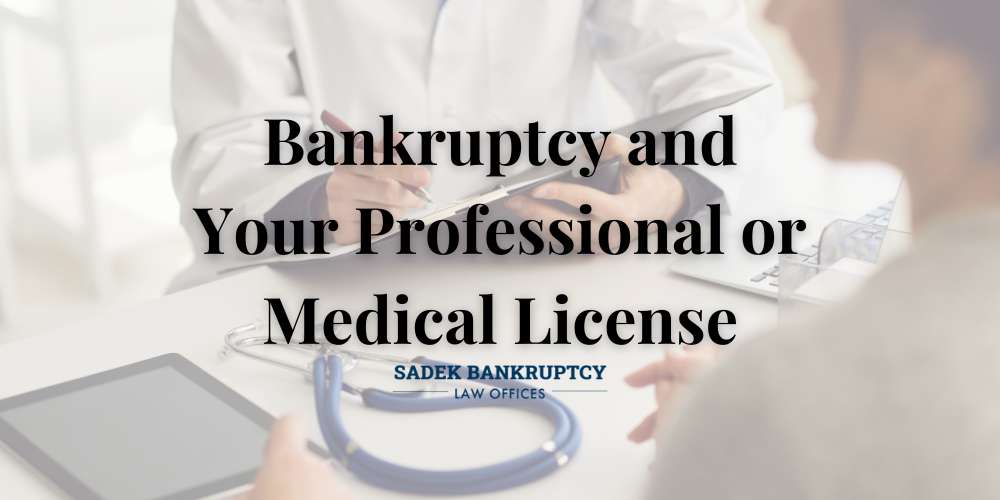Understanding How Bankruptcy and Professional Licenses Interact
Filing bankruptcy can feel overwhelming, especially if you’re a professional concerned about how it might affect your career. Whether you’re a doctor, lawyer, accountant, or hold another professional license, the fear of losing your livelihood can add even more stress to an already difficult situation. However, the truth is that bankruptcy filing doesn’t necessarily mean your career is at risk.
The attorneys at Sadek Bankruptcy Law Offices are here to help you understand how filing bankruptcy affects your professional licenses and what you can do to protect your credentials. To learn more about your rights during bankruptcy, please call our office at (215) 545-0008 for Pennsylvania or (856) 890-9003 for New Jersey to schedule your free consultation with us.
How Does Filing Bankruptcy Affect You and Your Professional License?
Filing bankruptcy can be a daunting decision, especially for professionals who hold licenses in fields such as healthcare, law, accounting, and other regulated industries. Personal bankruptcy, whether Chapter 7 or Chapter 13, primarily addresses your financial situation, but many professionals worry about how it could impact their ability to maintain their professional licenses.
In most cases, bankruptcy itself does not automatically lead to the suspension or revocation of a professional or medical license. Licensing boards are typically more concerned with issues like fraud or unethical behavior rather than the fact that you are seeking debt relief.
However, there may be additional scrutiny depending on the nature of your profession. For example, professionals with fiduciary responsibilities, like attorneys or financial advisors, could face questions from licensing boards if their bankruptcy is seen as a sign of poor financial management.
In these cases, it’s crucial to show that the bankruptcy was a result of circumstances beyond your control, such as unexpected medical expenses or a business failure, rather than irresponsible financial behavior.
For medical professionals, filing bankruptcy usually has little to no impact on their ability to practice. While some hospital employers or private practices may ask about your financial history, bankruptcy generally won’t jeopardize your medical license. If you’re concerned about how personal bankruptcy might affect your career or professional licenses, the Pennsylvania and New Jersey bankruptcy attorneys at Sadek Bankruptcy Law Offices can help.
How Does Bankruptcy Affect Your Job and Future Credit?
Bankruptcy can have a significant impact on your job and future credit, but it typically does not affect professional licenses. Employers in certain industries, especially those with financial or fiduciary responsibilities, may consider your bankruptcy when making hiring or promotion decisions.
However, most jobs do not require you to disclose personal financial information, and filing for bankruptcy is usually not grounds for termination. That said, if your job involves managing large sums of money or sensitive financial obligations, your employer may take a closer look at your financial history.
As for your future credit, bankruptcy will appear on your credit report for seven to ten years, depending on the type of bankruptcy you file. This can make it more difficult to obtain loans, credit cards, or mortgages in the future, and any credit you do receive may come with higher interest rates. However, many people are able to rebuild their credit within a few years by managing their finances responsibly post-bankruptcy.
Can You Be Denied a Job Because of Bad Credit or a Bankruptcy Filing?

In many cases, a prospective employer cannot deny you a job solely because you filed for bankruptcy. Bankruptcy court proceedings are public records, and while a potential employer may see this on your credit report, federal law protects individuals from discrimination based on bankruptcy.
However, certain industries, especially those involving financial management, may have stricter hiring policies. For example, positions that require handling sensitive financial information or fiduciary duties may involve a more detailed review of your financial background.
Private employers often have more discretion when evaluating a candidate’s credit report, but they must comply with the Fair Credit Reporting Act (FCRA). This law requires employers to obtain your consent before running a credit check and to notify you if adverse decisions are made based on the findings. While filing for bankruptcy might raise concerns for some employers, many understand that personal financial difficulties can be beyond your control.
Do Bankruptcies Show Up On Background Checks?
Yes, bankruptcies can show up on background checks, particularly if the check includes a review of your credit history. While a bankruptcy filing may be visible, it typically does not prevent you from obtaining a security clearance or maintaining a professional license, as long as the bankruptcy was not a result of fraud or unethical behavior.
So, Will Bankruptcy Affect My Job?

In most cases, bankruptcy does not directly affect your job. The Bankruptcy Code protects individuals from being fired or discriminated against solely because they filed for bankruptcy. However, certain jobs, especially those within a government agency or roles involving financial responsibilities, may have policies that require reviewing an employee’s financial background.
While bankruptcy affects your credit report and can raise concerns for positions with fiduciary duties, most employers are primarily concerned with your job performance, not your financial situation.
Will My Employer Know If I File Chapter 7?
Usually, your employer will not automatically know if you file for Chapter 7 bankruptcy. The New Jersey and Pennsylvania bankruptcy process is a largely private matter, so unless your wages are being garnished or you owe money directly to your employer, they will not be involved. If your employer conducts regular credit checks or if you work in a financial role, they may discover the filing.
Will My Employer Know If I File Chapter 13?
As we mentioned before, your employer most likely will not know if you file bankruptcy. This includes Chapter 13 bankruptcy. Unless you are facing wage garnishment in PA, your employer shouldn’t know about your bankruptcy. If your employer happens to conduct regular credit checks, they may see the filing on your credit report.
Can I Lose My Job If I File Chapter 7?
Under federal law, you cannot be fired solely because you file for Chapter 7 bankruptcy. The law protects individuals from employment discrimination based on bankruptcy filings. However, if your job involves handling financial responsibilities or requires a security clearance, your employer may have concerns about your bankruptcy, depending on the nature of your role. In these cases, we strongly recommend consulting with a New Jersey or Philadelphia bankruptcy attorney at Sadek Law to understand your rights.
Can I Lose My Job If I File Chapter 13?
Filing for Chapter 13 bankruptcy does not automatically put your job at risk. Federal law prohibits employers from firing or discriminating against employees simply because they have filed bankruptcy. Chapter 13 involves a structured repayment plan, which demonstrates your commitment to resolving your financial situation. While most employers won’t take issue with this, jobs involving financial management or sensitive roles may have specific policies regarding bankruptcy.
Contact a Pennsylvania and New Jersey Bankruptcy Attorney at Sadek Law Today
If you’re worried about how filing bankruptcy could impact your professional or medical license, it’s essential to have the right legal guidance. At Sadek Bankruptcy Law Offices, we understand the difficulties that come with managing financial hardships, whether they stem from medical debt, personal loans, or other financial challenges.
Our experienced attorneys can help you maneuver the bankruptcy process while protecting your career and credentials. Contact us today for a confidential consultation and take the first step toward securing your financial future without risking your professional license.





